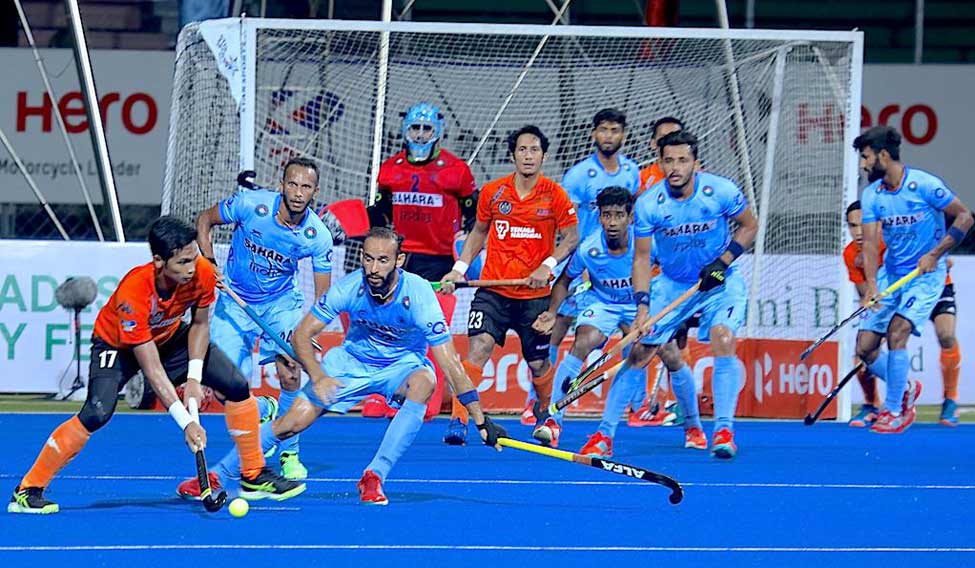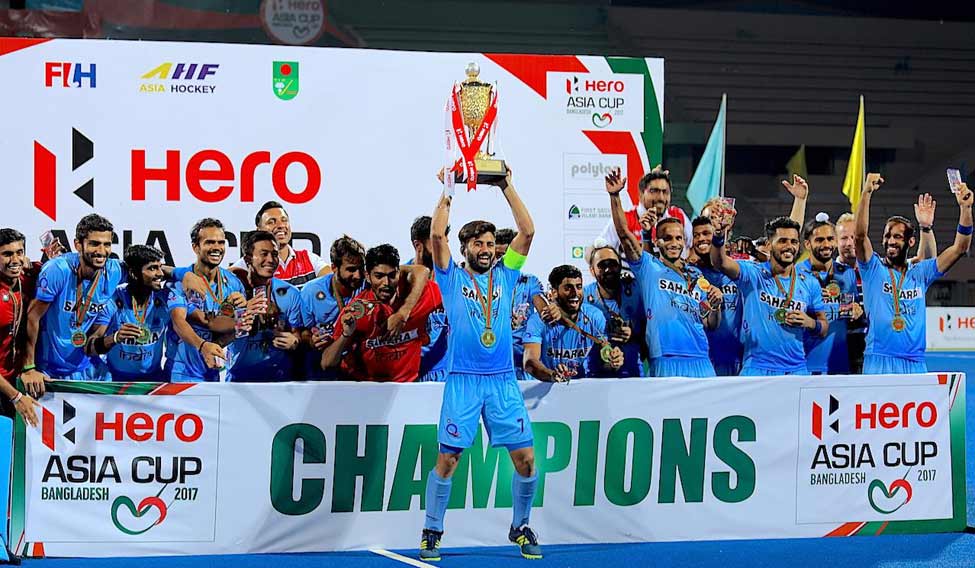Inside the Maulana Bhashani Hockey Stadium, there was a sense of relief in the Indian team. If Malaysia was disappointed in losing the final 1-2, India was simply glad they had crossed the finish line and secured a victory which halted a run of bad losses the team had piled up since the 2017 Azlan Shah and the Hockey World League Semi Finals in London. There were no screams of joy or massive excitement; simply a sense of respite, satisfaction, a kind of balm.
After the failure at the HWL in London where defeats against Malaysia and Canada had robbed India of a place in the semifinals, the turbulence caused by the sacking of Roelant Oltmans and the appointment of women’s team coach Sjoerd Marijne, critics had pointed out that it would get tougher for India. To win a tournament, that too the Asia Cup in your first assignment was very satisfying for Marijne. “I knew the pressure was there,” he said after India’s win in the final. “But I could only focus on one thing―either on the pressure or on the team.”
After the quarterfinal exit at the Rio Olympics, a few voices raised their concerns on Oltmans position as national coach. But India won the Asian Champions Trophy immediately after that followed by the Junior World Cup crown where Oltmans also sat in the dug-out with Harendra Singh, the junior coach. It seemed that the Dutchman’s contract would see itself out till at least the Tokyo 2020 Olympics. But some bad decisions at the Azlan Shah Cup and then losing those matches in London hastened the process and the few voices had become a chorus by then. Even Marijne’s appointment had its fair share of critics. Some said he didn’t have the experience of coaching a top national team and some questioned the very need for a “foreign” coach. What most forgot was that the Indian players with a sixth ranking in the world were now used to modern methods of coaching and that most Indian coaches were not in tune with what was happening in modern hockey. Thankfully, the consistency in coaching was maintained and Marijne took on the men’s team with a contract till the 2020 Olympics.
“I have seen the Indian men’s team but never worked with them,” Marijne said before taking the team to Dhaka for the Asia Cup. “I hope we start gelling together almost immediately, but I know that to understand every player will take time. Winning is a process and that would come with time.” Marijne knew he had a good team, but winning the Asia Cup after 10 years would have also mildly surprised him. It is honestly a four-team race in the Asia Cup―along with India, there is Pakistan, Malaysia and South Korea with Japan probably pushing the teams a bit. India, in fact, were held to a 1-1 draw with Korea, India having scored the equaliser in the last minute. And then there was the close game in the final even though India had beaten Malaysia 6-2 in the Super 4 stage.
 India players in action against Malaysia during the 2017 Asia Cup final held in Dhaka, Bangladesh | NNIS
India players in action against Malaysia during the 2017 Asia Cup final held in Dhaka, Bangladesh | NNIS
Apart from a few players, the team that played at the Asia Cup is what would represent India safely at the 2018 World Cup. The players who would get a look in are P. Sreejesh, the Indian goalkeeper out with an injury, Rupinder Pal Singh, also nursing an injury, Mandeep Singh, Talwinder Singh and most probably Kothajit Singh. Apart from the HWL Finals in Bhubaneshwar, which will begin on December 1, India’s main challenges are three tournaments in 2018―Commonwealth Games, Asian Games and the year-ending World Cup. India has never won the Commonwealth gold, but they are the reigning Asian Games champions and the last time they won the World Cup was in 1975.
For Marijne, the priority is the World Cup and the Asian Games. Winning the Asian Games ensures that India will directly qualify for the Olympic Games. But it’s the WC that India want. It would be too much to suddenly think of India as world champion, but a semi final spot is realistic and possible to achieve.
“I don’t want to think that far,” said Marijne. “It’s a process of training and competition. Every bit needs to fall into place for a podium finish. Let’s start the process and see where we can go with it.” But the Dutchman did believe there is a core team he can work with and at ‘times you can see the brilliance of the team’.
There is no doubting the skill factor of the Indian side. It’s the attitude and mental toughness that takes teams to the podium. Since the 80’ Olympics, India has not stood on the podium. They haven’t even reached the Olympic semi finals. The same is the story with the World Cup. Malaysian coach Stephan Van Huizen said it’s in the mind. “India is a very good team and with a high degree of skills. It’s just their belief that needs to be strengthened.”
What also works at the moment for the Indian team is this wonderful mix of experience and youth. Players like Sreejesh and Sardar are leaders in the team and they bring that eclectic mix of wide-ranging experiences. Sardar, who played midfielder till 2016, now found himself in the role of a central defender, sweeper back and a roving midfielder too. To play such a diverse role in the Indian team needs belief, strength, courage and an extremely high level of skill. Match after match, Sardar held the defence together and was also a mentor to youngsters like Sumit, Varun Kumar, Surender Kumar and Dipsan Tirkey. Once Sreejesh is back in the team, a leadership point opens up. Sreejesh in goal is India’s biggest asset, but as a leader he still calls the shots and rallies the team from behind.
With only a month left for the Hockey World League, the team reassembles in Bangalore around November 5 to begin their training and preparations. Doing something out of the ordinary at the HWL would be a pleasant surprise. But Marijne needs time to make the team understand his ideas. Every coach comes with a pattern that is distinctly his own. Most tactics and strategy in world hockey revolve around the same lines. But just like teams are differentiated and thus mark their presence with rankings, so do coaches. It’s a thin line that divides wins and defeats among the top six in the world. And that’s where understanding the team and melding it with your own thoughts helps in claiming more wins.
After India had beaten Pakistan 4-0 in the Super 4 stage in Dhaka, Marijne said, “I do understand the sentiment of an India-Pak match but we need to start winning at the top. In that sense, I am a fanatic and I hate losing.” For an India under Marijne, then the start has been good―an all-win start.





